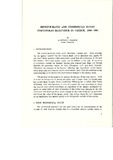| dc.contributor.author | Vliamos, Spyros | |
| dc.date.accessioned | 2015-12-11T09:43:09Z | |
| dc.date.available | 2015-12-11T09:43:09Z | |
| dc.date.issued | 1984 | |
| dc.identifier.issn | 1105-8919 | |
| dc.identifier.uri | http://hdl.handle.net/11728/6578 | |
| dc.description.abstract | The crucial questions which center monetary analysis are : What determines the money supply? Can the Central Bank act to influence that supply? If yes, how? These questions have generated a good deal of controversy in the past two decades. Given that money supply can be defined as the sum of currency in circulation outside the Banking System plus demand (and Time and Saving) deposits, the questions reduce to what determines cash and bank deposits. Therefore, the isolation of the factors affecting the ingredients of the money stock (especially total deposits which constitute the main bulk of it) will lead to the understanding of the mechanism which causes changes of the money stock. | en_UK |
| dc.language.iso | en | en_UK |
| dc.publisher | University of Pireaus | en_UK |
| dc.relation.ispartofseries | Spoudai Journal of Economics and Business;Vol 34, No 3-4 | |
| dc.rights.uri | http://creativecommons.org/licenses/by-nc-nd/4.0/ | en_UK |
| dc.subject | Commercial bank | en_UK |
| dc.subject | Econometrics | en_UK |
| dc.subject | Greece | en_UK |
| dc.title | Reserve ratio and commercial banks portofolio behaviour in Greece, 1960-1981 | en_UK |
| dc.type | Article | en_UK |


